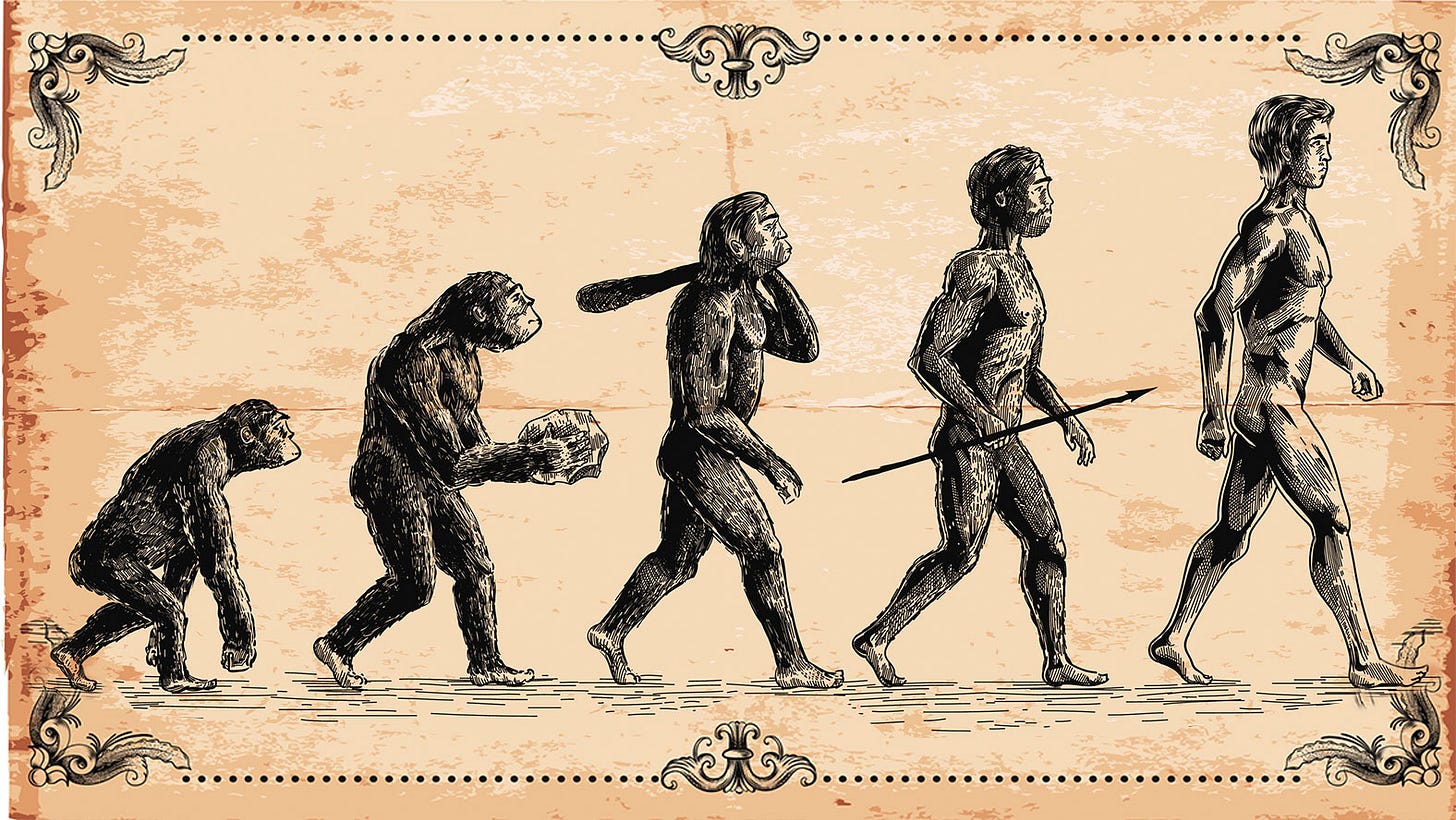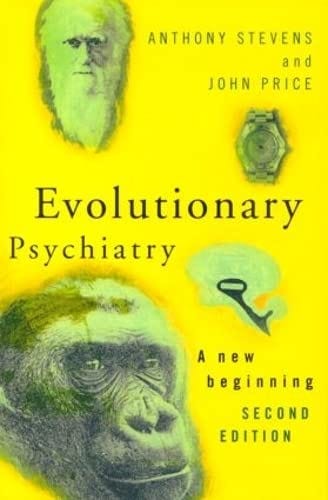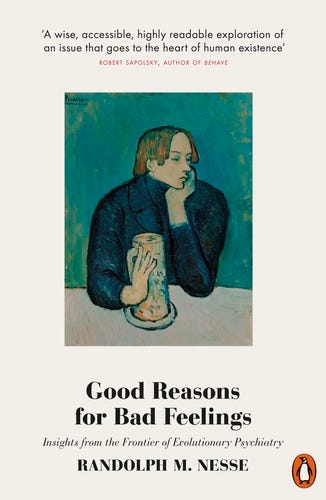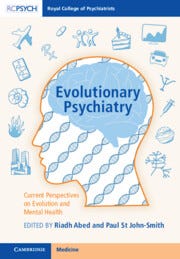What is Evolutionary Psychiatry?
Dr Gurjot Brar & Professor Henry O'Connell provide a brief overview

Evolutionary psychiatry seeks to blend the theory of evolution with current understanding of mental disorders. It has it primordial roots in ethology and biology, furthered by evolutionary psychology and medicine, which are gaining much traction in recent times (Nesse, 2022). Despite the body of literature emerging over the past two decades (Abed & St John-Smith, 2022; Nesse, 2019; Stevens & Price, 1996) it has yet to have a demonstrable impact on mainstream psychiatry.
Function and Dysfunction
Psychiatry has explored the complexities of human emotions and behaviour for many years. However, despite the vast amount of research conducted in this area, there appears to be a lack of clear understanding about the physiological aspects of these phenomena. This lack of clarity is in stark contrast to the rest of medicine, where the body's physiology is a crucial reference point for understanding disorders and dysfunctions (Nesse, 2016). To better treat and understand psychiatric disorders, a greater understanding of the physiological processes that underpin human behaviour is necessary. Evolutionary psychiatry has thus been proclaimed by evolutionists as the "essential missing basic science" (Nesse, 2019).
“essential missing basic science” (Nesse, 2019)
Before further exploration, it is important to state the potential error of ‘Viewing Diseases as Adaptations’ (VDAA) (Nesse, 2019). Evolutionists believe that it is not the diseases themselves that have evolved as adaptations, but rather the traits and systems that make us vulnerable to such diseases. By this logic, the traits and systems that make us susceptible to diseases could be seen as evolutionary adaptations, as these features have been passed down through generations and have been selected for due to their advantageous nature in allowing us to survive and reproduce. This explains why certain diseases are more prevalent in some regions than others due to selection pressures. One such example are heterozygote carriers of sickle cell disease conferring protection against malaria in endemic zones (Gluckman et al., 2009).

Evolutionary psychiatry extends the currently limited interpretation of the biopsychosocial model and raises fundamental and novel questions about mental health, mental illness, and treatments. The evolutionary perspective focuses on both ultimate (why) and proximate (how) questions in relation to mental illness and its treatment. (Abed & St John-Smith, 2022). For example, the evolutionary perspective acknowledges the potential benefits of low mood in the context of, e.g., loss, and the potential benefits of mildly elevated mood in propitious situations and the fact that these normal ‘moodostat’ mechanisms may be what go awry in mood disorders, whereby pathological mood changes lead to considerable distress and dysfunction.
Mismatch
The non-reductionist evolutionary approach seeks to embrace complexity and provides several testable theories in which to understand mental disorders. A good starting place is the generation and testing of hypotheses based on mismatch theory. Evolutionary mismatch, also known as ‘genome lag’ (Li et al., 2018), has been implicated for a range of disorders with increased prevalence in our modern environment such as hypertension, diabetes and obesity (Nesse & Williams, 1994). These ‘diseases of civilisation’ are thought to arise due to modern environments containing an abundance of food, combined with increasingly sedentary lifestyles (Nesse & Williams, 1994). Further examples of mismatch in modern environments across biopsychosocial domains include, biologically, low-grade chronic inflammation (Rubio-Ruiz et al., 2015), psychologically, high levels of chronic stress (Brenner et al., 2015) and socially, involuntary social isolation and loneliness (Heinrich & Gullone, 2006).

No single factor can be said to be causative, but rather a combination and greater magnitudes of mismatch may leave an individual vulnerable to disease. Thus, the evolutionary perspective allows us to ask questions such as what advantages such traits may have conferred in the Environment of Evolutionary Adaptedness (EEA), a term evolutionists use to describe an overall ancestral human environment during which distinctive traits of modern humans were shaped, not limited to any single time or place (Abed & St John-Smith, 2022). Some studies investigating the effect of mismatch in contemporary hunter-gatherer societies have been conducted (Chaudhary & Salali, 2022). These suggest postpartum depression may be a ‘phenotypic mismatch’ and potentially evolved as an adaptation to curb high infant-mortality rates (Herlosky et al., 2020), and attention-deficit hyperactivity disorder (ADHD) an ‘environmental mismatch’ due to the appearance of the 7R allele on DRD4 variants 40,000 years ago conferring advantages to foraging (Swanepoel et al., 2017; Tovo-Rodrigues et al., 2010). Finally, two studies investigating depression based on the Tsimane described the ‘sickness defence’ as reallocation of energy to immune function, and lower functional ability and lower participation in subsistence to be associated with higher depression scores (Stieglitz, Schniter, et al., 2015; Stieglitz, Trumble, et al., 2015). The findings of these studies are coherent with much of the literature on evolutionary psychiatry.
Current & Future Directions
Biological clinical applications of evolutionary psychiatry could be thought of already in their prime. Scientists recognise key molecules present throughout the body and our biology is comparable to other species. We share neurotransmitters with both invertebrates and other vertebrates (Bacqué-Cazenave et al., 2020; Huber et al., 1997), and considerable research has been conducted in establishing homology in the functional specialisation of the frontal lobe from macaques and other primates (Fuster, 2015). In terms of research trials, an evolutionary approach may allow us to look past the rigid paradigm of conventional psychotropic research, predominantly based on idealistic RCTs. Instead, we may develop a rigorous multi-faceted model of research also placing emphasis on for example, well-designed naturalistic and observational studies, allowing for capturing of novel evolutionary insights into the role of treatment in psychiatry.
Evolutionary perspectives also allow for broader and more pragmatic measures of health and illness, placing individuals in their wider social context. A notable example being the SOCIAL acronym (social situation, occupation, children and family, income, abilities, love, and sex) developed by Nesse (2019), which can be used to guide a broader definition of health and wellbeing, allowing psychiatry to pivot away from measuring outcomes as mere reductions on questionnaires. Additionally GOAL (give less weight to symptoms, observe actual behaviour, assess functional capacities and leave your office to observe behaviour in natural environments) (Troisi, 2022) allows for stratifying patients in terms of their functional capacities and targeting treatment accordingly. Troisi (2022) also argues the interpersonal relationship psychiatrists have with patients is also of biological relevance and is to be wielded as a powerful therapeutic tool as the target of future empirical research. Medical curricula can take advantage of individual differences to produce rich and varied doctors rather than continue unconsciously in favour of standardisation (Troisi, 2022). Indeed, it is startling how little if any content on evolutionary medicine is delivered to undergraduates (Grunspan et al., 2019), let alone evolutionary psychiatry.
Patients and healthcare providers seek to gain from adopting an evolutionary approach. For example, higher levels of stigma, propagated through delegitimization, social exclusion and rejection is a well-documented finding in FND (Foley et al., 2022) and PNES (Karakis et al., 2020) when compared to similar disorders with observable pathology. An evolutionary approach can provide normalisation of stigmatised disorders and enhance the therapeutic relationship. A recent publication aims to enhance cognitive behavioural therapy (CBT) using just such an evolutionary approach under the term ‘ICT’ (informed cognitive therapy) (Abrams, 2020). These additional biological and sociocultural questions, informed by an evolutionary perspective, are likely to help bring much-needed scientific rigour to evaluating treatments in psychiatry. One such topical application is with psychedelic therapies. An evolutionary perspective may allow novel insights into the recruitment of subjects, individual and population benefits, and adverse effects of therapy (Brar & O'Connell, 2023).
Conclusion
Recent interest in evolutionary psychiatry with simultaneous disappointments in the current model of biological psychiatry are creating fertile conditions for a new paradigm shift to take hold. Whilst this shift may not involve cutting-edge sophisticated research, it nonetheless bears significant potential for re-energising the field of psychiatry. The clinician armed with a good understanding of evolutionary psychiatry can include this approach to their diagnosis, formulation, and management of patients. Despite emphasis on theories and methods, evolutionary psychiatry provides a new conceptual framework in which to integrate the various findings from disparate research fields studying human behaviour and mental disorders, cohesively integrating ultimate and proximate causes for a more complete clinical picture. From history we recognise paradigms are not only necessary, but frequent, and arrive during periods of stagnation. In conclusion, this is no false dawn!

If you enjoyed this article and would like to discover more about Evolutionary Psychiatry please consider:
subscribing to our Substack to receive regular content updates
visiting the webpage of the Evolution and Psychiatry Special Interest Group within the College of Psychiatrists of Ireland
visiting the webpage of the Evolutionary Psychiatry Special Interest Group within the Royal College of Psychiatrists
exploring a Youtube playlist on curated presentations by the Evolution and Psychiatry Special Interest Group within the College of Psychiatrists of Ireland
exploring the Youtube page of the Evolutionary Psychiatry Special Interest Group within the Royal College of Psychiatrists
exploring the Evolving Psychiatry podcast





The primary role of evolutionary psychiatry, in my view, is to counter the analytical dogma - psychodynamic theory (actually, an assumption) that "mental illnesses arise from unsolved conscious conflicts [and traumas] in early childhood." We really can't have both ways: either children are born with a complete set of genetic tools (shaped by tens o of thousands of years of evolution) with all evolutionary adaptations and vulnerabilities OR they are born "tabula rasa," then parents/caretakers 'mold' them into either healthy or mentally ill adults. A solid and scientific evolutionary theory must confront the apparent absurdity of the latter proposal.
The biggest obstacle to the evolutionary psychiatric model lies in the popular classification, which excludes the key organ from the discussion. There is no mention of the brain anywhere in the DSM. The brain, however, is where all evolutionary (and psychopathological) changes occur. Only after introducing a classification based on dysfunctional neurocircuits might we be able to incorporate evolutionary psychiatry into the clinical scheme.
Presently, the evolutionary bases of mental disorders have limited practical therapeutic applications. We don't treat etiology, not only in psychiatry but also in the rest of medicine. We don't even treat pathology. The best we can do, with the available tools, is to restore lost or diminished functionality and reduce distress. Evolutionary psychiatry's contribution to treating psychiatric disorders is minimal at best. Still, it is a challenging intellectual exercise and helps make sense of mental diseases.
Lastly, I was unpleasantly puzzled by Dr. Troisi's words: "Medical curricula can take advantage of individual differences to produce rich and varied doctors rather than continue unconsciously in favour of standardization." I would like to know what compelled him to say that.